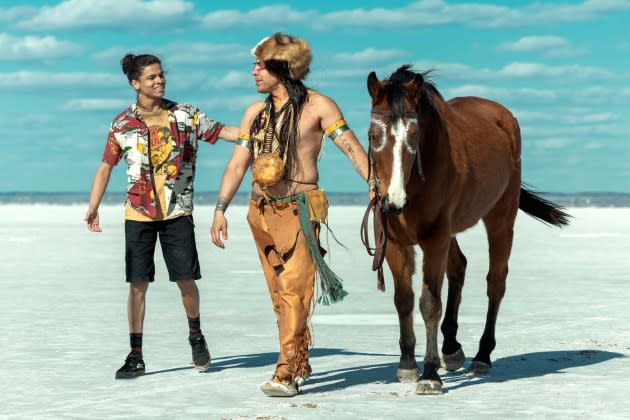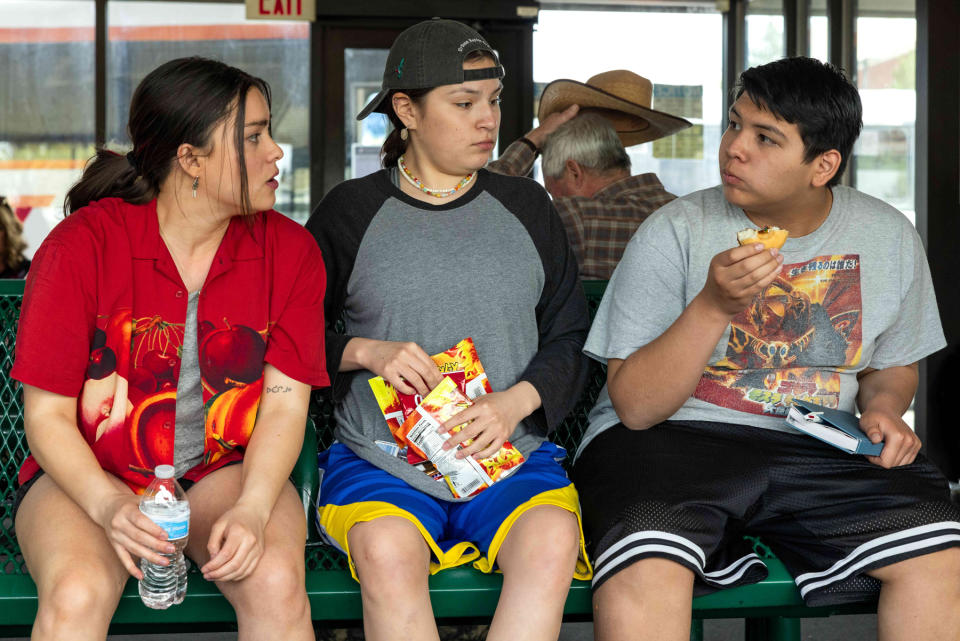‘Reservation Dogs’ Season 3 Premiere: A Great Show Begins Its Ending
- Oops!Something went wrong.Please try again later.
- Oops!Something went wrong.Please try again later.

This post contains spoilers for the two-episode Season Three premiere of Reservation Dogs, which is now streaming on Hulu.
“Bussin,” the first of this week’s two episodes, opens in typical, wonderful Reservation Dogs fashion. A tumbleweed blows across the plains, a Native warrior rides into the center of the frame, and calls out to all us young and old warriors watching from more comfortable surroundings. This is classic Old West right here, but the iconography is instantly undercut by the fact that the warrior in question is our pal William Knifeman, the lovable idiot whose spirit mainly seems to exist to annoy Bear. Though his speech is often a mix of wise old sayings and more modern idiom, here he is largely in the former mode, albeit with an undercurrent of gibberish. He promises us, “A story as old as time. A story as fresh as mountain dew. A story that happened yesterday. Or maybe it happened last week. Or maybe it has yet to even happen.” And as he prepares to ride off and let us watch the story unfold, his horse stubbornly refuses his commands to move.
More from Rolling Stone
Clive Owen Would Like to Make One Thing Clear: He's Not Afraid of Badgers
We've Found the Best Anime Series to Watch on Hulu This Month
'Dark Winds' Season 2 Is a Powerful Indictment of American Racism
Both that scene and the episodes that follow it are the perfect curtain-raiser for what we now know will be the final season of this incredible series. Even though its subject matter in theory is incredibly specific — Indigenous teenage friends growing up together on a reservation in rural Oklahoma — the show somehow has room for almost any subject, any tone, any idea. William Knifeman can be an idealized symbol and also a fool. We can get shaggy ensemble comedy in one episode, and then a dark, sad, but ultimately sweet two-character piece in the next. Whatever Sterlin Harjo and company want to accomplish, they do, brilliantly.
“Bussin” picks up largely where Season Two left off: the four main kids stuck in Los Angeles, having lost their car and cash, and with White Jesus as their only friend. The story bounces around in time a bit, and at first this seems to be because it’s being told by the highly distractable William Knifeman. In the end, though, it turns out that we’re seeing things unfold in the exact order we should. Bear takes the group to his father Punkin’s apartment, but of course the useless fool isn’t there; he’s clearly neglecting his new family at least as much as he once did Bear and Rita.
Instead, it’s Elora’s Aunt Teenie to the rescue (after a nausea-inducing Uber ride) with bus tickets back to the rez. Most of the episode is travelogue, including an Indiana Jones-esque sequence where we see them (as Fozzie Bear once put it) traveling by map. Bear gets stranded at a rest stop in Amarillo because he’s distracted by William’s talk of destiny, and the rest of the group doesn’t notice that he didn’t get back on the bus.
So the episode follows parallel tracks and tones. The rest of the ensemble is having fairly down to earth conversations — Willie Jack and Cheese about the inevitability of their other friends eventually leaving the rez, Teenie telling Elora that she shouldn’t expect to change very much once she’s an adult — while Bear is caught up in the mix of mysticism and absurdity that is William Knifeman. As William will admit in the next episode, he can only be so helpful, because the spirit council says, “I can only give you cryptic aphorisms.”
Eventually, though, we get to see Bear very much in the real world as we get the rest of his conversation with the mother of his new half-siblings, and we see the message Bear left for Punkin: “For once, I get to decide how you disappear. Have a good life, Dad.” That is a long way from the Bear of previous seasons who refused to accept that Punkin would always let him down. It’s the biggest sign of growth we’ve seen from the character whom the show positions as the group’s leader, even though Elora has been clearly more qualified for the job.
So “Bussin” is a loose, appealing return to this world, but about as straightforward as the series is capable of being. What follows in “Maximus,” though? That’s unique to Reservation Dogs, and very special.

We open the second episode in more alien terrain, as Bear seems trapped in an endless flat, barren plain, being pounded by the harsh sunlight. He has no food, no water, and no hope — and that’s before the ghost of a Spanish explorer on horseback(*) tries to kill him. William Knifeman proves useful for once, distracting the Spaniard with tales of gold treasure on the other side of the hill. The spirit is still more comedic than not — after Bear orders him away, we get an extreme close-up on Dallas Goldtooth’s face, one tear falling down his cheek like he’s Iron Eyes Cody in those iconic Seventies anti-littering ads — but as the episode moves along, we can see he had a good reason to separate Bear from the group so he could go on this strange quest. Even if he’s mostly a clown who likes to brag about how he and his buddies “used to hold it for each other when we peed,” he is not without his uses, both spiritually and narratively.
(*) A Spanish knight, appearing with windmills behind him? This episode is definitely a chance to dream the impossible dream.
But it’s once William is banished from the action that “Maximus” truly goes to a special place. Another attacker comes upon Bear, only this one is a 100 percent real product of the here and now in the form of the episode’s title character, played by the great Graham Greene.
Greene, one of a handful of Indigenous actors to ever be nominated for an Oscar, felt like an inevitability for this show before it ended. When you’ve got Wes Studi and Gary Farmer in recurring roles, can Greene be far behind? But if it’s a predictable casting choice, the role itself feels inspired. Maximus starts out aptly named, because with his mohawk, welder’s goggles, and tricked-out dune buggy, he initially comes across as someone out of a Mad Max film. Ultimately, though, he turns out to be suffering less from the anger definition of madness than the mental illness one. He is obsessed with aliens — “star people,” he insists on calling them — and has devoted his greenhouse to growing eggplants for them upon their return. Bear is at first justifiably unnerved by the guy, but soon they come to bond, particularly when Maximus shows him home videos of himself and his teenage friends, who are positioned very much as the Seventies Rez Dogs.
Earlier in the episode, William shows Bear a beaded eggplant medallion, akin to the beaded pickle medallion Bear bought for Punkin back in Season One. It doesn’t feel like a huge leap to get from that to this unwell but ultimately kind old man who grows eggplants for visitors we know will never come — and who in a short time feels like more of a father figure to Bear than Punkin has ever been.
The episode carefully takes its time showing the transformation in Bear and Maximus’ relationship. So by the time we get to the sad punchline — the people pursuing Maximus aren’t Men in Black types looking to keep star people a secret at all costs, but empathetic staffers from the mental hospital he keeps escaping — we can appreciate the loss Bear feels when his new friend is taken away from him. At the same time, though, the episode keeps open the possibility that Maximus isn’t as delusional as everyone else thinks. In a world where William Knifeman and the Spanish explorer can appear before Bear, and even interact a bit with the physical world, are star people that far-fetched? At one point, Maximus insists, “People are only concerned with things they can see and hear. But there are other layers of life that can’t be seen or spoken of. These need just as much attention and just as much care.” If that’s not a mission statement for Reservation Dogs, I don’t know what is. And when Bear departs Maximus’ property through the drainage tunnel that leads to the highway, it’s photographed to seem infinite and terrifying, like Bear has just wound up in a scene from James Cameron’s Aliens.
Shortly before the cops come, Maximus talks about how the light we see in the night sky comes from far in the distant past. “We are just echoes of things that came before,” he argues. But Reservation Dogs feels like an echo of nothing. It remains wholly original, and delightful, and we should treasure this last collection of episodes before the show itself winds up in the spirit world alongside William Knifeman.
Best of Rolling Stone

